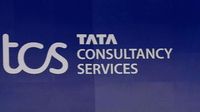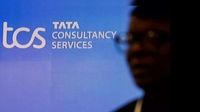Tata Consultancy Services (TCS), India’s largest IT services company, reported its fourth-quarter results for fiscal year 2025 on April 10, revealing a 1.69% decline in consolidated net profit, totaling ₹12,224 crore compared to ₹12,434 crore in the same quarter last year. While the net profit fell short of expectations, the company’s consolidated revenue from operations rose 5.3% year-on-year, reaching ₹64,479 crore, up from ₹61,237 crore in Q4 FY24.
Despite the profit decline, TCS's revenue growth was aligned with market expectations. The company’s operating margin for the quarter was reported at 24.2%, with a net margin of 19%. These figures indicate a slight contraction in profitability, yet they reflect the firm’s resilience in a challenging economic environment.
For the entire fiscal year 2025, TCS reported a total revenue of ₹2,55,324 crore, marking a 6% increase compared to the previous year. In constant currency terms, the revenue growth was slightly lower at 4.2%. This growth was significantly driven by robust performance in regional markets, which saw a remarkable 37.2% increase year-on-year.
The company’s board of directors has recommended a final dividend of ₹30 per equity share, subject to approval at the upcoming annual general meeting. This dividend follows a series of payouts throughout the year, bringing TCS’s total shareholder payout for FY25 to ₹44,962 crore.
CEO K Krithivasan expressed optimism regarding the company's performance, stating, "We are pleased to cross the $30 billion in annual revenues and achieve a strong order book for the second consecutive quarter. Our expertise in AI and Digital Innovation, coupled with the unmatched knowledge of customer context and global scale, makes us the pillar of support for our customers in this environment of macroeconomic uncertainty."
During Q4 FY25, TCS secured new deals amounting to $12.2 billion, contributing to a robust order book of $39.4 billion for the fiscal year. The company’s book-to-bill ratio stood at 1.6, indicating strong demand for its services. Key sectors driving this growth included Energy, Resources, and Utilities, which rose by 5.1%, and Manufacturing, which grew by 2.9%.
Regional performance varied significantly, with TCS’s North America business contributing 48.2% of total revenue for Q4 FY25, although this was a decline of 1.9 percentage points compared to the previous year. The UK market showed a modest growth of 1.2%, while the Indian market surged by 33% year-on-year, accounting for 8.4% of total revenue.
While the overall revenue figures were promising, TCS faced challenges in certain markets. The United States division experienced a 1.5% decline quarter-on-quarter, and the UK business saw a sharper drop of 4%. The European Union reported the steepest decline at 6.4%, indicating a need for strategic adjustments in these regions.
Amidst these fluctuations, TCS reported an attrition rate of 13.3% in its IT services segment, slightly up from 13% in the previous quarter. The company’s total employee headcount stood at 607,979, with 35.2% of employees being women. This diverse workforce reflects TCS’s commitment to inclusivity and gender equality.
In terms of innovation, TCS is actively investing in research and development. As of March 31, 2025, the company applied for 8,816 patents, including 267 during the quarter, and has been granted a total of 4,820 patents, with 235 granted in the same period. This focus on innovation is crucial for maintaining TCS’s competitive edge in the rapidly evolving tech landscape.
Looking ahead, Krithivasan mentioned the importance of adapting to market conditions, particularly regarding discretionary spending. He noted that while there were early signs of recovery in spending, these were not sustained due to ongoing uncertainties, including tariff-related discussions that have impacted decision-making processes among clients.
Despite these challenges, TCS remains committed to supporting its clients through this period of uncertainty. The company emphasizes maintaining close relationships with customers to help them achieve their core priorities, particularly in the face of macroeconomic challenges.
As TCS moves into fiscal year 2026, the company anticipates a better year ahead, driven by its strategic focus on AI and digital innovation. The management remains optimistic about future growth opportunities, emphasizing the importance of operational excellence and investment in talent development.
In conclusion, TCS’s fourth-quarter results reflect a mixed performance with challenges in profit margins amidst solid revenue growth. The company’s proactive approach to innovation and client engagement positions it well for future success in a competitive global market.







